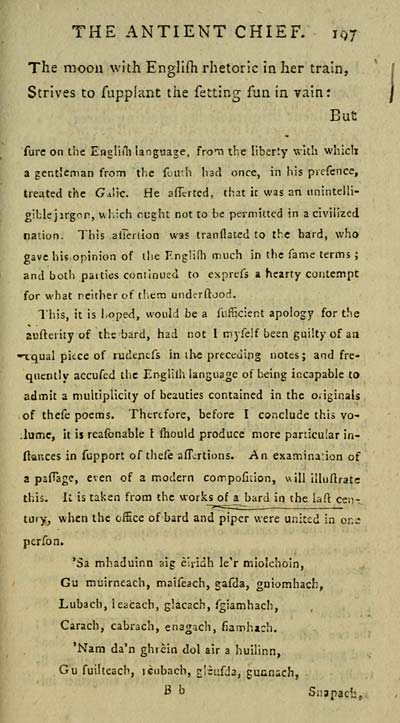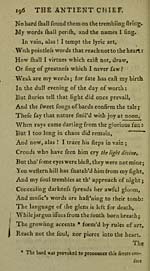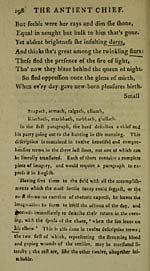Download files
Complete book:
Individual page:
Thumbnail gallery: Grid view | List view

THE ANTIENT CHIEF. iqj
The moon with Engllfh rhetoric in her train,
Strives to fupplant the fetting fiin in vain:
But
furc on the EngliiTi language, fronii the liberty vilth which
a gentleman from the fuirli had once, in his prcfencc,
treated the G^lic. He afTcrted, that it was an unintelli-
gible jirgnp, which ought not to be permitted in a civilized
nation. This aUertion was tranflated to the bard, who
gave his opinion of the F.nglifli m.uch in the fame terms ;
and both parties continued to exprefs a hearty contempt
for what rcither of them underftood.
This, it is loped, would be a iVifficient apology for the
auftcrity of the bard, had not I myfelf been guilty of an
•-xqual piece of rudericfs in ihc preceding notes; and fre-
qnentlv accufed the Englilh language of being incapable to
admit a multiplicity of beauties contained in the originals
of thefe poems. Therefore, before I conclude this vo-
.lumc, it is reafonable I fhould produce more particuiar in-
flances in fupport of thefe afT^rtions. An examina'ion of
a pafTage, even of a modern compofKion, uill lUuftrate
this. It is taken from the works of a^ bard in the lafl cen-
tary, when the office of bard and piper were united in or.s
pcrfon.
*Sa mhaduinn aig eliidh le'r mlolcholn,
Gu muirneach, maifeach, gafda, gniomhach,
Lubach, leacach, glacach, fgiamhach,
Carach, cabrach, enagach, fiamhach.
'Nam da'n ghrein dol air a huilinn,
Gu fuilteach, rcubach, glei-.fda, guunacb,
B b Snapacb,
The moon with Engllfh rhetoric in her train,
Strives to fupplant the fetting fiin in vain:
But
furc on the EngliiTi language, fronii the liberty vilth which
a gentleman from the fuirli had once, in his prcfencc,
treated the G^lic. He afTcrted, that it was an unintelli-
gible jirgnp, which ought not to be permitted in a civilized
nation. This aUertion was tranflated to the bard, who
gave his opinion of the F.nglifli m.uch in the fame terms ;
and both parties continued to exprefs a hearty contempt
for what rcither of them underftood.
This, it is loped, would be a iVifficient apology for the
auftcrity of the bard, had not I myfelf been guilty of an
•-xqual piece of rudericfs in ihc preceding notes; and fre-
qnentlv accufed the Englilh language of being incapable to
admit a multiplicity of beauties contained in the originals
of thefe poems. Therefore, before I conclude this vo-
.lumc, it is reafonable I fhould produce more particuiar in-
flances in fupport of thefe afT^rtions. An examina'ion of
a pafTage, even of a modern compofKion, uill lUuftrate
this. It is taken from the works of a^ bard in the lafl cen-
tary, when the office of bard and piper were united in or.s
pcrfon.
*Sa mhaduinn aig eliidh le'r mlolcholn,
Gu muirneach, maifeach, gafda, gniomhach,
Lubach, leacach, glacach, fgiamhach,
Carach, cabrach, enagach, fiamhach.
'Nam da'n ghrein dol air a huilinn,
Gu fuilteach, rcubach, glei-.fda, guunacb,
B b Snapacb,
Set display mode to: Large image | Transcription
Images and transcriptions on this page, including medium image downloads, may be used under the Creative Commons Attribution 4.0 International Licence unless otherwise stated. ![]()
| Early Gaelic Book Collections > J. F. Campbell Collection > Works of the Caledonian bards > (205) |
|---|
| Permanent URL | https://digital.nls.uk/82482044 |
|---|
| Description | Volumes from a collection of 610 books rich in Highland folklore, Ossianic literature and other Celtic subjects. Many of the books annotated by John Francis Campbell of Islay, who assembled the collection. |
|---|
| Description | Selected items from five 'Special and Named Printed Collections'. Includes books in Gaelic and other Celtic languages, works about the Gaels, their languages, literature, culture and history. |
|---|

